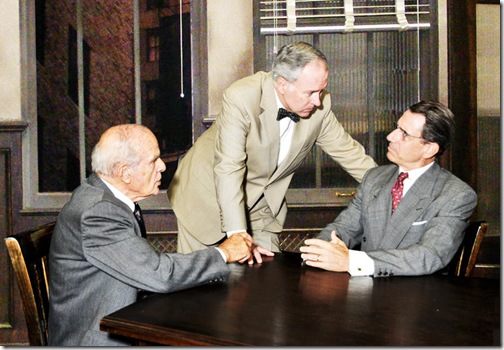As two-time Tony Award winner Frank Galati (The Grapes of Wrath, Ragtime) keeps in mind, “angry” is the 1954 Reginald Rose jury deliberation play’s middle name.
Twelve Angry Men, which opens this evening at the Maltz Jupiter Theatre, is more than half a century old, but it is also extremely timely.
“Now everyone seems to feel that this is a climate of anger. That the entire country is angry, that the voters are angry. That parents are angry, school boards are angry, drivers are angry, shoppers are angry, everyone seems to be angry,” says mild-mannered Galati, who is directing this production.
“Every one of the 12 jurors has a hot button that gets pushed, each one of them in one way or another kind of blows up, loses their cool. So, for whatever it’s worth, there seems to be something in the weather that connects to the rage that is apparently percolating underneath the dialogue in this play.”
As a reflection of the times when the play was first produced, the jurors in Twelve Angry Men are all white males. Galati wondered whether that would be an impediment for the audience and contemplated — briefly — moving the production to a more contemporary time.
“I think when you confront the challenge of interpreting the play, naturally you think, ‘Should it be a more diverse cast? Is there a way of making the issue of racism or bigotry or class-ism, all of those strains of hostility that are operating in the play, to somehow make them more relevant?’ But in looking at the play carefully, I think you come to realize that if you keep it very specifically in its historical moment, it actually has more universal resonance.”
 Keeping it in the past can be an asset? “Yes, I think it is,” notes Galati. “Because I think you find yourself saying, ‘Oh, my God, things have not changed.’ More than half a century later, we are still prejudiced.”
Keeping it in the past can be an asset? “Yes, I think it is,” notes Galati. “Because I think you find yourself saying, ‘Oh, my God, things have not changed.’ More than half a century later, we are still prejudiced.”
The play centers on the jury’s deliberations over a murder trial, a boy accused of killing his own father. But the audience knows none of the details of the case when the story begins. “One of the interesting things is the way exposition is delivered to the audience. The audience is not at the trial, so they have to find out the case from the discourse of the jurors,” says Galati. “It’s really pretty impressive, there’s a kind of artfulness that’s so skillfully in place that you don’t notice it.”
The dialogue seems to be hyper-realistic, but if you listen to it carefully, it has a musical quality. “I think it’s kind of like a great jazz ensemble,” Galati offers. Each of the jurors is, in effect, “a different instrument. One of the exciting aspects of working on it is to try to find the way in which in a great jazz band, let’s say, you’re creating harmony, but the individual voices are arguing. There’s dissonance, there’s discord and harmony at the same time.”
And while this seems to be a tense drama, even melodrama at times, Galati points out how much comedy is in Twelve Angry Men.
“Nobody dies, there’s no tragic conclusion and, in a certain way, the play celebrates the profound contract, the agreement, that is democracy,” says Galati. “So although there are guys in the play who suffer and who conceal their hurt and their pain, there is a kind of vitality in the characters, a kind of energy of living and a commitment to their responsibility as citizens.
“Some of the quirks of the characters, the tics, are funny. I mean, one guy is always thinking about when they’re going to eat. And one guy wants to get to the ballgame and all of his metaphors are from the ballpark.”
Ultimately, the play is a tribute to our precarious justice system.
“I don’t know, maybe the justice system isn’t working anymore, but I’d be very presumptuous to say so, I think,” says Galati. “Part of what’s skillful about the representation of a fictional jury and a fictional trial is that it has the kind of messiness and the uncertainty that I think really rings true.”
12 ANGRY MEN, Maltz Jupiter Theatre, 1001 E. Indiantown Road, Jupiter. Thursday, Nov. 4, through Sunday, Nov. 14. Tickets: $46-$53. Call: (561) 575-2223 or (800) 445-1666.
